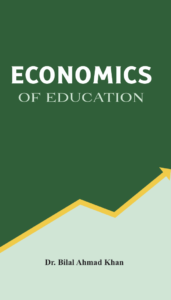Table of Contents
Toggle
Education is an investment in the future, not just a means of acquiring knowledge. However, have you ever considered the true price of education and the advantages it offers? We’ll go into the Economics of Education in this post, looking at the effects that education has on people, societies, and economies. Regardless of your role in education—student, parent, teacher, or just interested—this guide will help you comprehend why education is one of the most effective means of bringing about change.
An Overview of Education Economics
An Overview of Education Economics

Although many people view education as a means of achieving personal achievement, it is much more than that. It is a crucial component of economic growth. The concept of “Economics of Education” describes how economic outcomes are impacted by education on both a personal and a social level. It involves comprehending the monetary components of education, ranging from the price of tuition to the financial gains from educational investments.
Although many people view education as a means of achieving personal achievement, it is much more than that. It is a crucial component of economic growth. The concept of “Economics of Education” describes how economic outcomes are impacted by education on both a personal and a social level. It involves comprehending the monetary components of education, ranging from the price of tuition to the financial gains from educational investments.
Education Is Important for Reasons Beyond Degrees
Education Is Important for Reasons Beyond Degrees

Have you ever wondered why individuals devote years to their studies? Obtaining a degree may seem like the obvious solution, but education has many advantages that go well beyond a certificate. Critical thinking is strengthened, problem-solving abilities are improved, and better decision-making is encouraged by education. More broadly, educated people are more likely to innovate, support economic progress, and contribute to society.
The Education Ripple Effect
Not only does education help the individual. Families, communities, and entire economies are all impacted by the knock-on effects. Consider learning as a seed. When planted and cared for, it develops into a tree that produces fruit that many people can enjoy. The inventions, knowledge, and skills that drive economic growth are the results of education.
The Price of Education: Analysing the Data
The Price of Education: Analysing the Data

Education has costs associated with it that might be high. Housing, books, tuition, and other costs soon mount up. However, what precisely are these expenses meant to cover, and how do they alter depending on the level of education?
Education’s Direct Expenses
Tuition, fees, and instructional supplies are included in the direct costs. These costs can be extremely expensive for a lot of families. They are, nevertheless, frequently viewed as an essential investment in a child’s future.
Education’s Opportunity Costs
The concept of opportunity cost describes what you forfeit when you select one course of action over another. When it comes to education, this could refer to the money someone gives up by going to school rather than working. Although this is a hidden expense of education for many, it should be taken into account when calculating the actual cost of education.
The Government’s Function in Financing Education
The Government’s Function in Financing Education

The role of governments in funding education is vital. The main source of funding for public schools is taxation; however, governments sometimes offer loans, scholarships, and subsidies to assist higher education.
Taxes and Public Education
Because public education is supported by tax dollars, everyone can access it. However, how successful is this system? Depending on the nation and area, public education funding varies greatly in efficiency. It causes underfunded schools and subpar results in some regions, whereas well-funded schools and high educational attainment in others are the effects.
Scholarships and Financial Assistance
To increase access to higher education, governments frequently offer scholarships and financial aid. These initiatives have the potential to drastically lower students’ educational costs, freeing them to pursue higher education without having to worry about accruing enormous debt.
Comparing Public and Private Education: A Cost-Benefit Study
Comparing Public and Private Education: A Cost-Benefit Study

Is paying more for private education worthwhile? Many parents and students struggle with this question. Let’s examine the advantages and disadvantages of public and private schooling.
Comparing Costs
Although private education can be more expensive, it also offers more individualised attention, better facilities, and smaller class sizes. Although less expensive, public education might not offer these benefits.
Long-Term Advantages
Public education gives greater access and social diversity, even while private school could produce better immediate results, including higher test scores. Both have long-term financial advantages, but they rely on how well education is provided and what opportunities it opens up.
Human Capital: The Worth of Education to the Economy
Human Capital: The Worth of Education to the Economy

Human capital is one of the most valuable resources in the modern economy. It is the information, abilities, and experience that a person possesses. An individual becomes more valuable to the economy the more educated they are.
The Return on Investment in Education
A frequent word in finance is return on investment (ROI), and it also applies to education. Your prospective profits increase as you increase your educational investment. Research indicates that people with greater education likely to make more money overall than people with lower education.
Career and Education
Employability is increased by education. People with higher levels of education have a higher chance of landing jobs, keeping them, and developing in their professions. By lowering unemployment rates, this helps the economy in addition to the person.
Education and Economic Development: How Knowledge Promotes Progress
Education and Economic Development: How Knowledge Promotes Progress

In what ways does education support economic expansion? It’s that simple: invention fuels economic progress, and education fosters innovation.
Inventiveness and Efficiency
People with higher levels of education are also more likely to innovate, developing new goods, services, and technology. Productivity gains from these inventions contribute to economic growth.
An Expert Staff
The workforce needs to be educated if the economy is to grow. Higher educated nations typically have more resilient economies due to the more skilled and adaptive labour force.
The Worldwide View: Education in Underdeveloped Nations
The Worldwide View: Education in Underdeveloped Nations

Education is a worldwide concern. While educational standards are high in industrialised nations, access to high-quality education is frequently limited in developing nations. There are important economic ramifications to this discrepancy.
Difficulties in Developing Nations
Many developing nations struggle with issues including poverty, infrastructural deficiencies, and unstable political environments that impede educational progress. These obstacles impede economic growth by limiting educational achievement.
Foreign Assistance and Education
International organisations and wealthy governments frequently give funding to support education in underdeveloped countries in an effort to close the education gap. Enhancing access to education is the goal of these initiatives since it is thought to be crucial for fostering economic growth.
Education Inequality: The Financial Cost of Unequal Access
Education Inequality: The Financial Cost of Unequal Access

Although access to school is far from equal, education is frequently considered as a great equaliser. The cycle of poverty is typically sustained by educational disparity, which is frequently caused by economic inequality.
The Education Gap and Wealth
The disparity in wealth has a major effect on educational prospects. Richer families can afford better schools, more resources, and more care for their children, which gives them an advantage over their less fortunate counterparts.
Extended Economic Repercussions
Long-term economic repercussions stem from educational disparity. It keeps income inequality alive, restricts social mobility, and lessens economic diversity. It is imperative to address these problems in order to build a society that is both prosperous and egalitarian.
Education’s Future: Emerging Trends and Their Economic Consequences
Education’s Future: Emerging Trends and Their Economic Consequences

Education is rapidly evolving, and these developments have important economic ramifications. Let’s examine the trends influencing education going forward, from individualised instruction to online learning.
Online Education
Due to its accessibility and flexibility, online learning has grown in popularity among students worldwide. This movement has the power to democratize education by opening up access to it for people who might not have been able to attend traditional educational institutions.
Individualised Instruction
Education may now be tailored to each student’s needs thanks to technology improvements. This approach has the potential to improve educational outcomes and increase the economic value of education by better preparing students for the workforce.
Education and Globalisation
Education is becoming more and more globalised as the world gets more interconnected. This trend is creating more chances for cross-cultural communication and learning, which has the potential to spur global economic expansion.
Conclusion: Education’s Long-Term Effects on Society
Conclusion: Education’s Long-Term Effects on Society

The economics of education is an essential component of our reality, not just an area of study. Societies, economies, and individuals are shaped by education. It’s an investment that yields several benefits, including both economic and personal development. It is obvious that education will remain a key factor in bringing about change, creativity, and prosperity as we move to the future.
Frequently Asked Questions Regarding Education Economics
Frequently Asked Questions Regarding Education Economics
The economics of education examines how economic results are impacted by education, with a particular emphasis on the advantages and disadvantages of education for individuals as well as for society.
Education promotes innovation, raises productivity, and improves skills—all of which contribute to economic growth. A robust economy requires a workforce with a high level of education.
Economic differences frequently cause educational inequality since wealthy people have access to better educational resources. This keeps people in the poverty cycle.
Tax revenues are used by the government to support public education, while financial aid is given to support postsecondary education. Greater access to education is ensured by this.
Globalisation, individualised education, and online learning are some of the themes that will impact education in the future. These adjustments could improve outcomes and increase access, which has important economic ramifications.

